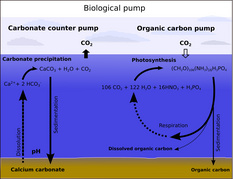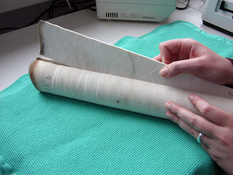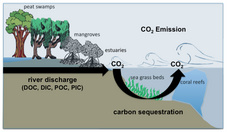Carbon is the main element linking the biosphere and the climate as it serves as a greenhouse gas in the atmosphere and as a building-block of life. We are interested in studying processes through which organisms influence their environment and respond to climate changes and perturbations of the carbon and nutrient cycles.
Carbon and nutrient cycles are concepts, which help to better understand the complex interplay between the biosphere and the climate. The carbon cycle includes reservoirs such as the biosphere, the atmosphere, the hydrosphere and the lithosphere and is driven by biological, physical and geological processes, which control the distribution of carbon within the different reservoirs. The amount of carbon that is stored in the atmosphere strongly influences the climate. Climate changes and the associated variations of the CO2 concentration in the atmosphere could in turn enforce a redistribution of carbon by affecting respective biological, physical and geological processes. Such complex feedback mechanisms, which could stabilize systems or lead to shifts after crossing certain thresholds are still poorly understood but are crucial to predict the future and understand global changes in the past.
Sustained Indian Ocean Biogeochemistry and Ecosystem Research
The idea of this IMBER associated project is to develop a new, basin-wide programme in the Indian Ocean focused on biogeochemical and ecological research, with the existing and planned observing systems and expeditions providing the observational backbone (see SIBER).
The Monsoon and the global carbon cycle

In addition to the biological uptake of CO2 and the long-term accumulation of carbon in e.g. peat soils and marine sediments, silicate weathering is another important sink of CO2 in the course of which CO2 and silicates (rocks) react to carbonate. The produced carbonate accumulates in the soils and is transported by rivers into the ocean. The inputs of dissolved carbonates into the ocean, its uptake by the biological pump and the subsequent sedimentation of carbonate controls the pH and therewith CO2 uptake of the ocean on geological time-scales.
Due to its dependence on the temperature, the availability of water and the CO2 concentrations in soils, the silicate weathering provides a strong feedback mechanism mitigating climate changes. We study the monsoonal and human impacts on silicate weathering and soil erosion in central Asia during the last 20.000 years. (-> see CARIMA)
Biological pump in coastal upwelling systems
 The carbonate counter and the organic carbon pump in the ocean. Their net effect on the marine CO2 uptake is referred to as the Biological Pump
The carbonate counter and the organic carbon pump in the ocean. Their net effect on the marine CO2 uptake is referred to as the Biological PumpThe biological pump is a series of processes influencing the CO2 uptake of the ocean and the long-term carbon storage in marine sediments. Our studies focus on the highly productive eastern boundary upwelling systems and their equivalent in the Indian Ocean.
These are ideal study sites of global importance because they contribute ~ 8% to the global marine primary production and reveal extremely strong biogeochemical gradients within a relatively small area.
This allows us to investigate the response of the biological pump to environmental changes under natural conditions, which helps us to better understand the functioning of the biological pump, and its response to global changes. (see GENUS, CARIMA, Biogeochemical fluxes in the Indonesian Sea, JGOFS).
Climate and environmental reconstructions obtained from coral cores
 The overarching goal is to investigate land-sea interactions with respect to natural and anthropogenic changes off Hainan, China. Within this framework this subproject aims at studying impacts of the monsoon, climate anomalies, and land use changes on the coral reefs off Hainan. Therefore δ18O und δ13C ratios as well as Sr/Ca ratios will be measured in a core derived from a Porites coral (see LANCET).
The overarching goal is to investigate land-sea interactions with respect to natural and anthropogenic changes off Hainan, China. Within this framework this subproject aims at studying impacts of the monsoon, climate anomalies, and land use changes on the coral reefs off Hainan. Therefore δ18O und δ13C ratios as well as Sr/Ca ratios will be measured in a core derived from a Porites coral (see LANCET).
Response of marine organisms to changes in the pCO2
Adaptation strategies of crustose coralline algae to ocean acidification
Crustose coralline algae (CCA) are important calcium carbonate producers fostering reef accretion by stabilizing reef sediments. Within this project we investigate how CCA respond to increasing pCO2 particularly with respect to their growth and Mg-content and we assess how these responses change the competitive strength of these algae. Experiments will be performed under controlled laboratory conditions and the results obtained will also be validated in the field by investigating the Mg-content in CCA growing in reefs naturally exposed to varying levels of pCO2 (e.g. in Costa Rica).
Coral reef adaptation strategies to carbonate chemistry changes along the Costa Rican Pacific coast
The main objective of this project is to study the ecological responses of coral reefs and the associated socioeconomic implications to changes in the carbonate chemistry caused by upwelling along the Costa Rican coast.
Carbon and nutrient cycle in tropical costal ecosystems
 Impacts of riverine carbon inputs on the carbon cycle in the coastal ocean and the CO2 emissions into the atmosphere.
Impacts of riverine carbon inputs on the carbon cycle in the coastal ocean and the CO2 emissions into the atmosphere.Tropical costal ecosystems such as tropical peat swamps, mangroves and coral reefs served as important carbon reservoirs in the past. According to present estimates they will disappear within the forthcoming 100 years if the present rate of degradation holds on. Within this context the main task is to monitor the ongoing development, to quantify impacts on the global cycle and to develop sustainable mitigation strategies in the framework of carbon trade mechanisms (see SPICE).




